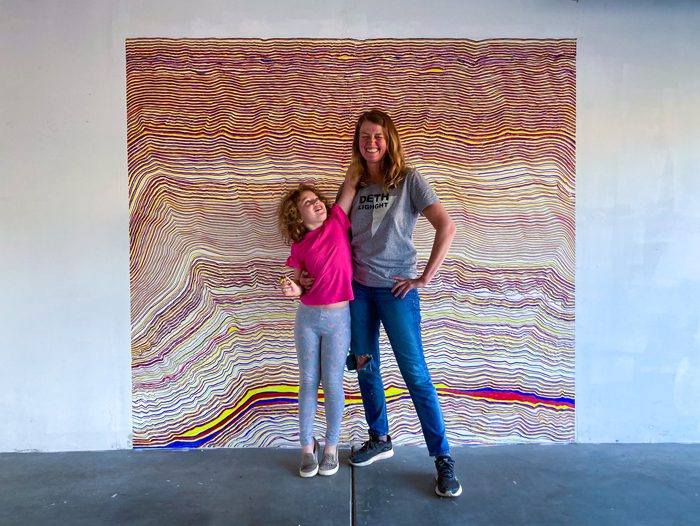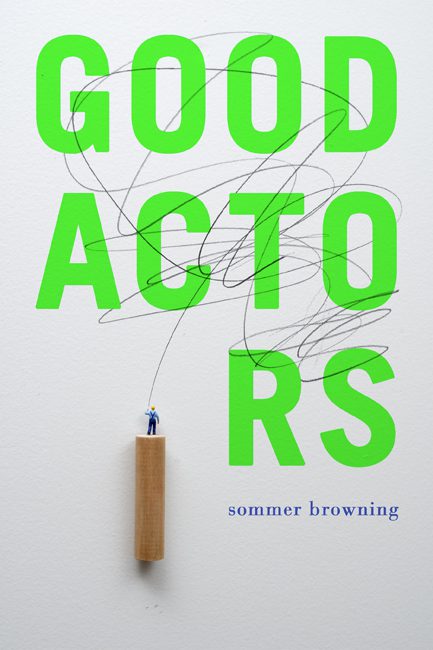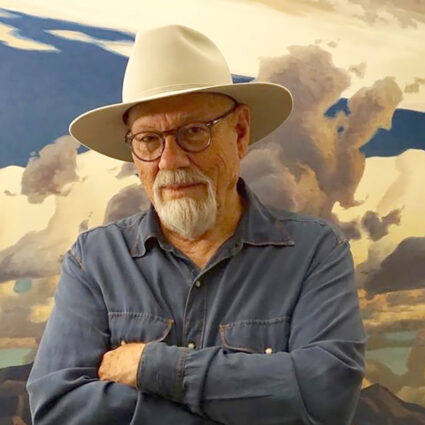Denver poet, librarian, gallerist, and comedian Sommer Browning talks about her new book Good Actors and how it relates to other art forms and interests.

Birds, LLC—an independent poetry press out of Brooklyn, New York—recently published Sommer Browning’s third full-length collection of poetry. Titled Good Actors, the book explores aging, motherhood, and desire through an entertaining combination of humor, language play, formal invention, and idiosyncratic cultural touchstones.
Throughout the collection, the Denver-based poet references women such as Phyllis Diller, Carol Burnett, Joan Rivers, Alice Notley, Etel Adnan, Lyn Hejinian, and her own mother (just to name a few) as aesthetic, intellectual, and emotional figures who have shaped the manner in which she processes the world around her and creates art.
These woman are comedians, film and television actors, poets, scholars, artists, and mothers. And, in many ways, this eclectic grouping of female creators mirrors Browning’s own passions and interests. For she is not only a poet, but also a librarian, an arts writer (which includes contributions to Southwest Contemporary), a curator and gallerist, cartoonist, comedian, video artist, mother, and (lucky for me) a personal friend.
Recently, Browning agreed to an email interview with me in order to discuss her newest collection. Given her wide-ranging interests, we focused on elements of her book that relate to topics outside of or beyond the scope of the merely poetic.

The cover of your book reproduces an image of Liliana Porter’s Man Drawing. Could you tell me how you became familiar with the artist’s work and what attracts you to her work? Additionally, why did you decide to use a reproduction of this particular piece for your cover design?
I first saw Porter’s work at El Museo del Barrio in Manhattan in January of 2019. It was a big show, a survey of maybe forty years of her work. She started as a printmaker and now makes films, installations, plays, and photographs. So the exhibition was full, various, and exciting to me; I love when people do many things. There are several through-lines in her work, but one that attracted me to her is her sense of humor. The way she subverts expectations is so wonderful and smart. She has a collage piece called Dialogue with Christ/Lamp that depicts a plastic lamp in the shape of Christ’s head peering directly into the face of a much smaller Mickey Mouse figurine. First, what the hell are they talking about? And second, the fact that the lamp is very obviously unplugged is hilarious to me in a bombing-comedian-is-this-thing-on? kind of way. Almost all her work that I’ve seen blurs the line between the world the viewer is in and the world the artwork is in. The figurine in Man Drawing is drawing on the actual gallery wall.
To me, this is a subversion of reality that I feel aligned with. Not to get too far out, though I love getting far out, reality has always been a bit suspect to me. Slippery. We think we have a handle on things, but how can we when everything is translated through this imperfect body, this fallible memory, these careening feelings? Talk about denial. I know is probably the most comical thing one can say.
Man Drawing encapsulates this notion for me, among a few others. And while maybe this distrust of reality is not a theme of the book, the book is playing around with fiction, storytelling, scripts, screens, and things like that.
Your book’s title, Good Actors, is also the title of the first poem in the collection. It opens with the line: “I want to make a movie before I’m forty-five.” And the epigraphs to the book are attributed to John Cassavetes and the video artist Jeanne Liotta. To this extent, could you address the relationship between poetry and film/video? Or, at very least, discuss how you understand film/video functioning as a framing mechanism for the book?
I love film. If I could live another life, I would be a dancer. But if I could live a second other life, I would be a filmmaker. This is a hard question. Now I’m thinking about all the white space between scenes in a film, all the stuff you insert that you don’t even realize: oh, they’re in a grocery store now, they must have located the car keys, got into the car, drove the fifteen minutes to the store, found a place to park, blah blah blah. Amazing how one fills that in! But we only fill it in if we trust the filmmaker. If the filmmaker set it up right, had someone say, Shit I forgot the turkey! right before the grocery scene, for instance. We do this in poetry, too. Jump from image to image, and if we trust the writer, it works. It feels like magic.
Not sure if that answers this question or if I even believe that. But this notion of trust is interesting, and even unsettling, and I want to think about it more.
Interlaced throughout Good Actors is a long, crowd-sourced poem. Each section begins with the phrase: “If you tell me which Twilight Zone episode you remember best, I can tell you what your problem is.” Could you tell me a little bit about the process you went through when creating this poem? Also, what compelled you to create a text in which you crowd-sourced material? Finally, the poem seems to pathologize both memory and pleasure. Would you agree? Could you talk about how that manifests itself in both your book and day-to-day life?
I posted that question on Twitter and Facebook as a lark in a way, but also because I felt that TZ was a show that plumbed human worries, dreads, dreams, and fantasies and if one episode stuck with you it probably was because it spoke to those worries and dreams. But people started answering the question! And so, naturally, I had to tell them what their problem was. It really took off. I rewatched the episodes I couldn’t remember, let that soak into my consciousness, and translated it all back into modern therapy-speak in the form of a pseudo-aphorism. I responded to every person, over 200 I think!
I feel like an amalgamation. I have a joke that goes, “Being born is just plagiarizing your parents.” Much of my work, whether books or essays or videos, reflects this directly in various ways like this crowd-sourced part of the book.
As far as the pathologizing goes, the whole TZ section is, I hope, a send-up of the rampant pathologizing that the commodification of self-care, therapy—our inner lives—is forcing on us. But I also hope this TZ section is tender enough that it’s honoring our need to be seen and known and, ultimately, to connect with one another. We are still just these beasts with barely evolved consciousnesses shoving coins in a parking meter so we don’t get ticketed when we go into the courthouse to sign our divorce papers. Life is absurd.
In your author photo in Good Actors, you and your daughter stand before a rendition of Sol LeWitt’s Wall Drawing 797, which you curated in 2020 for your garage gallery GEORGIA. What are the connections between your life in the visual art world (as a curator, art writer, and artist) and your life in the literary world? How do you see them informing one another? Or, conversely, challenging one another?
[The photo] sums up so much of my life. My daughter is trying to give me bunny ears, I’m smiling wildly, my jeans are ripped to hell, I’m wearing a shirt one of my best friends made for me that says “Deth Lighght,” and I’m standing in front of another crowd-sourced artwork! Every part of my life informs every part of my life. What I know about line-breaks makes me host better parties. What I felt when I stood before a Jack Whitten painting makes me a more patient mother. It certainly isn’t always positive, I’m sure. I still can’t really get a handle on romantic relationships… maybe that means I need to do more stand-up or make more films! Ha. I suppose this goes back to the amalgamation idea. What you do matters. What you read, watch, say, witness, share, and express shapes you and everyone you touch. I don’t know. Something like that.
A dual book release event for Browning’s Good Actors and Sueyeun Juliette Lee’s Aerial Concave Without Cloud (read Michael Joseph Walsh’s review of Lee’s latest poetry collection in Southwest Contemporary) is scheduled to take place from 6 to 8 pm MT on Friday, May 27, 2022 at Dikeou Pop-Up, 312 East Colfax Avenue, Denver.
Excerpts from Good Actors can be found at Brooklyn Rail, The American Poetry Review, and jubilat.



